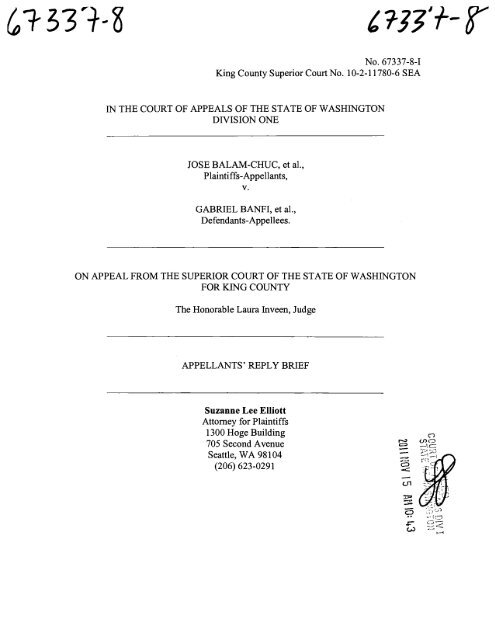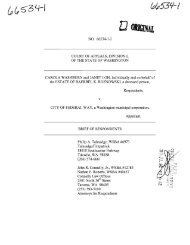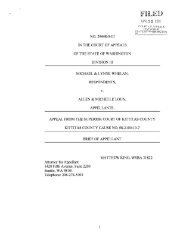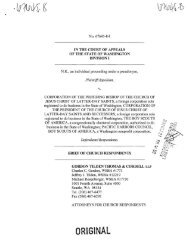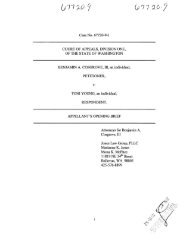No. 67337-8-1 King County Superior Court - Washington State Courts
No. 67337-8-1 King County Superior Court - Washington State Courts
No. 67337-8-1 King County Superior Court - Washington State Courts
You also want an ePaper? Increase the reach of your titles
YUMPU automatically turns print PDFs into web optimized ePapers that Google loves.
<strong>No</strong>. <strong>67337</strong>-8-1<br />
<strong>King</strong> <strong>County</strong> <strong>Superior</strong> <strong>Court</strong> <strong>No</strong>. 10-2-11780-6 SEA<br />
IN THE COURT OF APPEALS OF THE STATE OF WASHINGTON<br />
DIVISION ONE<br />
JOSE BALAM-CHUC, et aI.,<br />
Plaintiffs-Appellants,<br />
v.<br />
GABRIEL BANFI, et aI.,<br />
Defendants-Appellees.<br />
ON APPEAL FROM THE SUPERIOR COURT OF THE STATE OF WASHINGTON<br />
FOR KING COUNTY<br />
The Honorable Laura Inveen, Judge<br />
APPELLANTS ' REPLY BRIEF<br />
Suzanne Lee Elliott<br />
Attorney for Plaintiffs<br />
1300 Hoge Building<br />
705 Second A venue<br />
Seattle, W A 98104<br />
(206) 623-0291
TABLE OF CONTENTS<br />
A. REPLY STATEMENT OF FACTS .................................................... 1<br />
B. REPLY ARGUMENTS ...................................................................... 1<br />
1. This <strong>Court</strong>'s recent decision in Murphey v. Grass, 2011 WL<br />
5127622, - Wn. AW. -, - P.3d - (Oct. 31, 2011), confirms the<br />
Balam-Chucs' argument that their claims accrued on the date Jose<br />
was torced to leave the United <strong>State</strong>s . ............................................ 1<br />
2. This <strong>Court</strong> should reject Banfi 's claim that the failure to meet a<br />
statutory deadline is not negligence as a matter oflaw .................. 5<br />
3. The question of whether Banfi was responsible fOr supervising his<br />
paralegal cannot be resolved on summary judgment because the<br />
facts regarding that claim are disputed. ......................................... 7<br />
4. Rebeka Balam-Chuc and the children have a loss of consortium<br />
claim that is not barred by the statute oflimitations . ..................... 9<br />
D. CONCLUSION ................................................................................. 11
Cases<br />
T ABLE OF AUTHORITIES<br />
Balam-Chuc v. Mukasey, 547 F.3d 1044 (9 th Cir. 2008) .......................... 10<br />
Green v. American Pharmaceutical Co., 136 Wn.2d 87,960 P.2d 912<br />
(1998) ...................................................................................................... 9<br />
Hizey v. Carpenter, 119 Wn.2d 251,830 P.2d 646 (1992) ..................... 4,8<br />
Huffv. Roach, 125 Wn. App. 724, 106 P.2d 268, review denied, 155<br />
Wn.2d 1023, 126 P.3d 1279 (2005) ........................................................ 3<br />
Janicki Logging & Canst. Co. v. Schwabe, Williamson & Wyatt P. C. 109<br />
Wn. App. 655, 37 P.3d 309 (2001), review denied, 146 Wn.2d 1019,51<br />
P.3d 88 (2002) ......................................................................................... 3<br />
Murphey v. Grass, 2011 WL 5127622, - Wn. App. - , - P.3d - (Oct. 31,<br />
2011) .............................................................................................. passim<br />
Ueland v. Reynolds Metals Co., 103 Wn.2d 131,691 P.2d 190 (1984) ..... 9<br />
Other Authorities<br />
Faure & Strong, The Model Rules of Professional Conduct: <strong>No</strong> Standard<br />
for Malpractice, 47 Mont. L.Rev. 363, 375 (1985-1986) ....................... 8<br />
11
A. REPLY STATEMENT OF FACTS<br />
The Balam-Chucs stand by their statement ofthe issues and of<br />
the facts found at pages 2 to 8 ofthe Appellants' opening brief. To the<br />
extent that the appellants disagree with Banfi's statement of the facts,<br />
they will be discussed below.<br />
B. REPLY ARGUMENTS<br />
1. This <strong>Court</strong>'s recent decision in Murphey v. Grass,2011 WL<br />
5127622, - Wn. App. -, - P.3d - (Oct. 31, 2011), confirms the<br />
Balam-Chucs' argument that their claims accrued on the date<br />
Jose was forced to leave the United <strong>State</strong>s.<br />
In their opening brief, the Balam-Chucs argued that under settled<br />
law and public policy considerations, the Balum-Chucs' causes of<br />
action did not accrue until they had suffered actual and appreciable<br />
harm. In this case, that occurred on the <strong>No</strong>vember 25,2009, when Jose<br />
was forced to leave his family and return to Mexico. Because the<br />
complaint was filed less than one year later, this lawsuit was clearly<br />
timely.<br />
1
Just after the Respondent's brief was filed this <strong>Court</strong> issued its<br />
decision in Murphey v. Grass, supra. In that case Murphey hired Grass,<br />
a certified public accountant to prepare certain tax returns. Grass was<br />
negligent in completing his duties and, in 2004, Murphey learned that<br />
he might owe as much as $100,000 in back taxes. He fired Grass and<br />
told him he was assessing his damages, but that Grass should inform<br />
his malpractice carrier of Murphey's potential claim for damages. Id.<br />
at *1.<br />
<strong>State</strong> auditors then began determining the true amount of taxes,<br />
penalties and interest due. Murphey contested the auditor's<br />
assessments and appealed those assessments and penalties to the Board<br />
of Tax Appeals. Id. at *2. In 2009, while the appeal was pending,<br />
Murphey sued Grass.<br />
Grass moved for summary judgment alleging that the three-year<br />
statute of limitations began to run, at the latest, in 2006 when Murphey<br />
learned of Grass's negligence. The trial court agreed, granted Grass's<br />
motion and dismissed the case.<br />
On appeal Murphey argued that his claims did not accrue until<br />
he suffered actual damages and that did not occur until the<br />
administrative tax appeal process concluded. Grass (just like Banfi)<br />
2
elied on Huffv. Roach, 125 Wn. App. 724, 106 P.2d 268, review<br />
denied, 155 Wn.2d 1023, 126 P.3d 1279 (2005), and Janicki Logging &<br />
Canst. Co. v. Schwabe, Williamson & Wyatt P. C. 109 Wn. App. 655,<br />
37 P.3d 309 (2001), review denied, 146 Wn.2d 1019,51 P.3d 88<br />
(2002), to argue that Murphey's claims accrued the moment he knew of<br />
the malpractice. But this <strong>Court</strong> held that:<br />
Grass's reliance on these cases is misplaced. Huffand<br />
Janicki are not inconsistent with Feddersen and, in any<br />
event, presented different issues. In all three cases, the<br />
claims accrued when the plaintiffs learned of injury that<br />
was certain.<br />
Id. at *4 (emphasis added). This <strong>Court</strong> said that potential liability is not<br />
the equivalent of actual harm. The <strong>Court</strong> concluded that Murphey's<br />
liability for the taxes was not certain until the "appeals division made<br />
the assessments final, binding and due for payment."<br />
The Murphey decision precludes all of the arguments made by<br />
Respondent at pages 17-22. In June 2002, the Balam-Chucs learned<br />
that, due to Banfi's negligence, Jose might be removed from the United<br />
<strong>State</strong>s. But, just as there was no actual harm to Murphey in June 2002<br />
when he learned that Grass's negligence might cost him $100,000,<br />
there was no "actual harm" to the family when Banfi failed to file the<br />
3
petition. l Like Murphey's continued challenges to the tax assessments,<br />
the Balam-Chucs contested the rejection ofthe untimely LIFE petition<br />
for seven years in the federal immigration and appellate courts. Just as<br />
the amount of tax Murphey actually owed was speculative until the<br />
administrative appeals concluded, Jose's actual deportation was<br />
speculative until the final order of removal was implemented on<br />
<strong>No</strong>vember 25,2009.2 Until that time, no one, not even the Ninth<br />
Circuit, believed that Jose would actually be deported. The result of<br />
accepting the Respondent's argument would be a flood of negligence<br />
lawsuits filed within three years of any negligent act by an attorney,<br />
such as failing to appear for a hearing or to file a timely pretrial motion<br />
to meet a pretrial deadline, even if no danlages resulted from the<br />
negligence.<br />
1 The Respondent argues that the fact that the Balam-Chucs filed a bar complaint<br />
demonstrates that all of the elements of the legal malpractice claim accrued. Brief of<br />
Respondent at 19. But a breach of one's ethical duty does not necessarily require<br />
proof of malpractice. See Hizey v. Carpenter, 119 Wn.2d 251, 830 P .2d 646 (1992)<br />
(Violation of the RPCs may not be used as evidence of legal malpractice). Similarly,<br />
in Murphey, this <strong>Court</strong> found that counsel's letter telling Grass to notify his insurance<br />
company did not mean that the action had accrued.<br />
2 The Respondent states that the "injury" in this case was Jose's lost "opportunity to<br />
process his adjustment of status under the LIFE Act." Brief of Respondent at 19. But<br />
that is not true. Had Jose lost his opportunity under the LIFE Act, but been permitted<br />
to adjust his status in some other way, then there would have been a negligent act but<br />
no injury. The injury was his removal from the country.<br />
4
The reasoning in Murphey confirms the Balam-Chucs' analysis<br />
set forth in their opening brief at pages 9-16. Know ledge of the<br />
"occurrence" ofthe malpractice is not necessarily the date upon which<br />
the claim accrues. Law and public policy support the conclusion that<br />
under the facts of this case, the Balam-Chucs' claim did not accrue<br />
until Jose was forced to leave the country.<br />
2. This <strong>Court</strong> should reject Banfi 's claim that the failure to meet a<br />
statutory deadline is not negligence as a matter of law.<br />
Banfi asks this <strong>Court</strong> to dispose of the Balam-Chucs' claim that<br />
his failure to meet the statutory deadline was negligence as a matter of<br />
law in a remarkable manner. He argues that an attorney can only be<br />
negligent as a matter oflaw ifhe or she fails to correctly determine the<br />
applicable statute of limitations. He argues that because the "Balam-<br />
Chucs do not claim that the failure to file the petition was due to Mr.<br />
Banfi's ignorance of the filing deadline," there was no negligence on<br />
his part. Brief of Respondent at 16. Under his theory, as long as<br />
counsel knows of the deadline, all of his further actions are insulated<br />
from a claim of negligence even if the attorney does nothing to meet<br />
the deadline or to insure that steps have been taken by his staff to meet<br />
the deadline. This <strong>Court</strong> should reject this argument expeditiously.<br />
5
Instead, to comply with the duty of care, an attorney must<br />
exercise the degree of care, skill, diligence, and knowledge commonly<br />
possessed and exercised by a reasonable, careful, and prudent lawyer in<br />
the practice of law in this jurisdiction. !d. at 261. The Balam-Chucs<br />
provided the declaration of Carol Edwards, an experienced immigration<br />
attorney. She stated that there were no gray areas regarding the<br />
statutory deadline and that the standard of practice in the immigration<br />
community was to insure that the Petition was timely filed. CP 138-<br />
140. Banfi failed to meet that standard of care.<br />
Jose came into Balam's office with the certainty of being<br />
granted legal status. Banfi had a duty to file the Balam-Chucs' petition<br />
by April 30, 2001. But because he failed to do so, Jose was forced to<br />
leave the country. The filing of legal documents in a timely manner is<br />
a basic function of any attorney's duty to their client. Many times there<br />
are a range of choices available to counsel that would discharge<br />
counsel's duty to a client. When it comes to meeting statutory<br />
deadlines, however, there are no alternatives to meeting the required<br />
deadline. This <strong>Court</strong> should find that Banfi committed negligence and<br />
violated the standard of care that attorneys owe to their client.<br />
6
3. The question of whether Banft was responsible for supervising<br />
his paralegal cannot be resolved on summary judgment because<br />
the facts regarding that claim are disputed.<br />
In addition, Banfi attempts to avoid liability in this case by<br />
blaming his paralegal. He spends considerable time attempting to have<br />
this <strong>Court</strong> make factual findings that he had no hand in preparing or<br />
filing the petition or supervising the paralegal who assisted him. But<br />
this is a question of hotly disputed fact in this case.<br />
Ms. Edwards stated that by signing the G-28 <strong>No</strong>tice of<br />
Appearance in the federal immigration proceedings he became<br />
responsible as attorney of record for the family's LIFE petition. CP<br />
138-140. The record before the trial court establishes that the Balam-<br />
Chucs retained Banfi to file a family visa petition and application of<br />
adjustment of status for Jose. They specifically wanted to hire a<br />
bilingual attorney and they learned that Banfi was bilingual. CP 23.<br />
The Balam-Chucs completed and signed the forms and gave Mr. Banfi<br />
a check for the filing fee. He wrote to the Balam-Chucs. CP 134-135.<br />
Mr. Banfi signed the forms on March 30, 2001. CP 137. By signing,<br />
he swore that he had prepared the document at the request of Jose and<br />
that it was based upon "all information of which I have any<br />
7
knowledge." <strong>No</strong>t only that, Mr. Banfi gave written directions to Ms.<br />
Inchauste about her duties in the case. CP 133, 136. Ms. Inchauste has<br />
a note in the file from Mr. Banfi that states: "Reviewed and signed!<br />
Let's talk about files." The note is dated 4/15/01. Ms. Inchauste notes<br />
underneath, "OK to proceed per Gill." CP 136.<br />
In short, although Banfi now claims that he had no<br />
responsibility to supervise the duties of the paralegal assigned to the<br />
case he had been retained to handle, the facts are clearly in dispute.<br />
Thus, there is a question of fact that must be submitted to the jury.3<br />
Even if this <strong>Court</strong> could theoretically affirm the trial court's decision on<br />
3 Moreover, the Respondent's argument relies on the assertion that Banfi's duty of<br />
care as to his paralegal is defmed solely by the <strong>Washington</strong> Rules of Professional<br />
[RPC] conduct. But, the <strong>Washington</strong> <strong>State</strong> Supreme <strong>Court</strong> has expressly stated that<br />
violations of the ethical rules cannot be used as evidence of malpractice. Hizey v.<br />
Carpenter, 119 Wn.2d 251,830 P.2d 646 (1992). The RPCs serve to establish the<br />
"'minimum level of conduct below which no lawyer can fall without being subject to<br />
disciplinary action.'" Hizey, 119 Wn.2d at 262 (quoting RPC Preliminary <strong>State</strong>ment).<br />
But a legal malpractice action is based on what a "reasonable" lawyer would do in a<br />
particular situation. Both of these standards should "continue to operate in their<br />
relative, separate spheres" and the RPCs should not extend into the malpractice area,<br />
considering that there are adequate common law bases for malpractice. [d. Because<br />
the RPCs govern the relationship between an attorney and the court system and a<br />
malpractice claim focuses on the relationship between an attorney and client, basing a<br />
malpractice claim on the RPCs improperly elevates the RPCs that focus on the<br />
attorney-client relationship. Hizey, 119 Wn.2d at 263 (quoting Faure & Strong, The<br />
Model Rules of Professional Conduct: <strong>No</strong> Standardfor Malpractice, 47 Mont. L.Rev.<br />
363,375 (1985-1986). Conversely, adherence to the ethical rules does not provide<br />
complete insulation from a claim of negligence or provide irrefutable proof that the<br />
attorney met the standard of care for lawyers.<br />
8
other grounds, it cannot affirm summary judgment on a ground that<br />
involves disputed issues of fact.<br />
4. Rebeka Balam-Chuc and the children have a loss of consortium<br />
claim that is not barred by the statute of limitations.<br />
Banfi argues without citation to any authority that because the<br />
claims for loss of consortium brought by Rebeka and the children did<br />
not accrue until after Jose's claims were barred by the statute of<br />
limitations, their claims are also barred. The flaw in Banfi's argument<br />
is that <strong>Washington</strong> recognizes loss of consortium as an independent,<br />
not derivative, claim. Thus, a child or spouse's cause of action for loss<br />
of consortium accrues when he or she first experiences injury due to<br />
loss of consortium, regardless of when the other spouse's injury claim<br />
accrues. Green v. American Pharmaceutical Co., 136 Wn.2d 87, 101,<br />
960 P.2d 912 (1998); Ueland v. Reynolds Metals Co., 103 Wn.2d 131,<br />
691 P.2d 190 (1984). Banfi makes no effort to distinguish this clearly<br />
controlling precedent from the <strong>Washington</strong> Supreme <strong>Court</strong>. Thus, the<br />
order dismissing these claims is clearly erroneous and must be<br />
reversed.<br />
Similarly, Banfi's argument that the "injury" occurred in 2001<br />
before either child was born simply denies the facts. The "injury" in a<br />
9
loss of consortium claim is the loss of love, care and relationship with<br />
the family member. In this case, that did not occur until <strong>No</strong>vember<br />
2009, when Jose was forced to leave the country. Clearly, Rebeka and<br />
the children had a loving family relationship before Jose was forced to<br />
return to Mexico.<br />
Moreover, this <strong>Court</strong> should reject Banfi's argument that the<br />
any loss of consortium in this case was "de minimus." First, the issue<br />
of damages is one for the jury, not this <strong>Court</strong>. Counsel cannot find a<br />
single <strong>Washington</strong> case that approves an order of summary judgment<br />
on the grounds that the potential damages were "de minimus."<br />
Second the argument is without legal basis and is offensive.<br />
Essentially, Banfi argues that because Jose was not in a permanent<br />
vegetative state, the children did not "entirely lose the ability to<br />
communicate and engage with their parent." Even though Jose was<br />
forced to move thousands of miles away and barred by law from<br />
traveling to see his children in their home, at their school activities and<br />
from participating in normal fanlily life, in Banfi's view the injury to<br />
his wife and children was negligible and temporary.4 And, Banfi<br />
4 In addition, there is simply no proof that the injury was "temporary."<br />
10
apparently misses the irony of arguing that that damage was de<br />
minimus in this case. Banfi was hired to file a Petition under the LIFE<br />
Act. The purpose of that Act was to preserve families and to avoid "the<br />
undesirable alternative of forcing aliens to leave their families in the<br />
Unites <strong>State</strong>s while they applied for a visa abroad." Balam-Chuc v.<br />
Mukasey, 547 F.3d 1044, 1046 (9 th Cir. 2008). Certainly Congress did<br />
not view forcible separations as "de minimus."<br />
It is safe to say that reasonable minds can differ about whether<br />
the traumatic, forcible separation of a father from his family for nine<br />
months has a "de minimus" effect on his wife and children. The<br />
defendants can certainly make their arguments to the jury. But many<br />
potential jurors might conclude that the forcible separation from a<br />
parent for even one week would be devastating to a child.<br />
D. CONCLUSION<br />
This <strong>Court</strong> should reverse all ofthe orders entered by the trial<br />
court and remand this case for trial.<br />
Respectfully submitted this 14th day of <strong>No</strong>vember, 2011.<br />
Lee Elliott, WSBA 12634<br />
ey for Appellants<br />
11
CERTIFICATE OF SERVICE<br />
I certify that on <strong>No</strong>vember 14,2011, had a copy of this pleading<br />
delivered by first class mail, postage prepaid, to:<br />
William Hackney<br />
Mr. Sam B. Franklin<br />
Lee Smart<br />
1800 One Convention Place<br />
701 Pike Street<br />
Seattle, WA 98101-3929<br />
Mr. John Rothschild<br />
Attorney at Law<br />
705 Second Avenue, Suite 1100<br />
Seattle, W A 98104<br />
12


